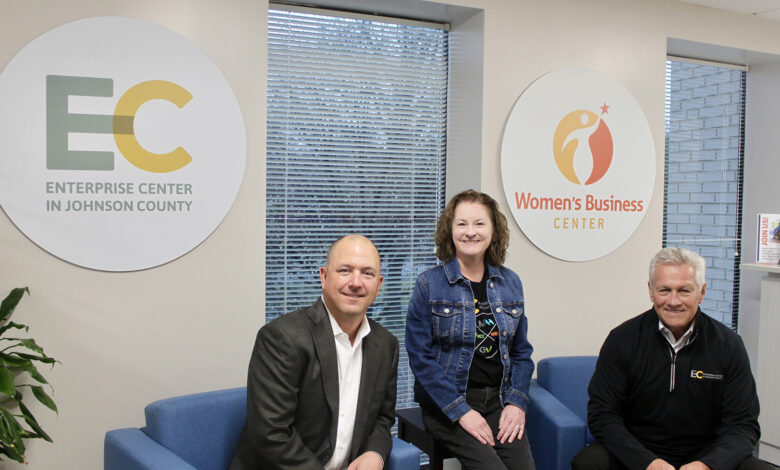It’s easy for small biz to get lost in the shuffle; How ECJC offers a lifeline to Main Street, startup entrepreneurs

The Enterprise Center in Johnson County is on a mission to prove the Kansas City metro remains a place where small businesses can grow and thrive, shared CEO Jeff Shackelford.
ECJC — which is home to the Women’s Business Center, the Mid-America Angels and the Women’s Capital Connection angel investment networks, as well as the Growth Mentoring Service and the LaunchU entrepreneurial programs — is a hub for connecting entrepreneurs in both Kansas and Missouri to resources for access to capital, consulting, education, mentoring, and networking.
“We work with early-stage entrepreneurs who might want to start a main street business — a coffee shop on the corner — to tech entities or rapidly growing companies that might need to raise $2 million and everything in between,” Shackelford said.
“Across the Women’s Business Center and the Enterprise Center — over the last 12 months — we’ve supported more than 1,000 entrepreneurs with either technical assistance — so that’s one-on-one counseling or participating in a webinar or training session — to direct grants and debt funding that we’ve been able to help them secure or access,” added Brande Stitt, executive director of the Women’s Business Center and director of entrepreneurship for ECJC.
The nonprofit also collaborates across the ecosystem with other entrepreneurial support organizations — like the Small Business Development Centers in Kansas and Missouri and AltCap — to serve as a catalyst for local businesses and startups and to foster innovation and economic growth.
Entrepreneurship can be a rough road, noted John Brandmeyer — ECJC board chair and CEO of Brandmeyer Enterprises — and it’s easy to get lost in the nuances of trying to run a business, raise capital, and keep up with the accounting.
“This center has been a resource for this area and any entrepreneur that is seeking some guidance that maybe they couldn’t find anywhere else,” he continued.
Access to capital is a challenge for entrepreneurs at any stage, Stitt shared, so ECJC helps to connect them to angel investors — through the Mid-America Angels and Women’s Capital Connection networks — local venture capital firms — like KCRise Fund and Flyover Capital — and loans — through AltCap. The nonprofit is also working to build up more programming to help the business owners become more loan ready.
“What we know is that underserved, underrepresented entrepreneurs do not get the funding that they need,” she continued. “So the more that we can do as organizations to position them in a way that they can get access to the funds that they need to start their business or grow their business, it really benefits the entire ecosystem, in terms of job creation, and wealth creation for those entrepreneurs.”
The continuum of capital has always been a big focus for ECJC, Stitt noted, but they are filling in the gaps with other kinds of programming.
“We really understand that you can’t just throw money at an entrepreneur or small business,” she added. “You have to provide the support services and really get them either prepared to access the capital or understand how to utilize the capital once they have it.”
For programming, ECJC offers the Growth Mentoring Service, LaunchU, and Equipped for Equity to help entry-level business owners and those looking to scale and raise capital.
“We do a lot to support that very early-stage entrepreneur,” Stitt explained. “We do a lot to support the established entrepreneur. So we’re trying to fill the gap for entrepreneurs in the middle who still need that support. As we look to the growth of the Enterprise Center, we’re looking at developing programming that’s really about that growth for an early- to mid-stage company.”
Growth Mentoring Service is modeled after the MIT-licensed program that pairs seasoned mentors with growth-stage founders seeking to scale.
“We brought it here to help more established companies,” Shackelford continued. “You have to have been in business at least a year, have a minimum amount of revenue, and want to grow from the current stage to the next stage.”
LaunchU is an eight-week program designed to help an entrepreneur figure out if their business concept is viable with topics like concept development, market research, competition profiling, pricing, and financial projections.
“You really end up with a business plan,” he noted. “Or maybe in some cases, identifying that you’re not ready to launch that business is just as important.”
Equipped for Equity is a five-week program to help small businesses with their strategy for raising capital.
“We do a lot of training on that side,” Shackleford said. “What do I need to prepare? How do I tell my story and how do I lay that out to become bankable?”
OneKC for Women
Through the Women’s Business Center — the only one of its kind in Kansas — and the Women’s Capital Connection, ECJC provides resources for women entrepreneurs to start and grow their businesses.
“I think that is a lacking area that needs more effort,” Brandmeyer noted. “A lot of people think entrepreneurship and think men. But I think there’s a huge opportunity for women to participate and be very successful.”
In 2013, the Women’s Business Center and the Women’s Capital Connection joined forces with the Women’s Employment Network in KCMO to launch the OneKC for Women initiative, according to Stitt.
“It’s really intended to help women plug in to our organizations wherever they are in their professional life and personal life to become financially successful,” she explained.
“We cross pollinate,” she continued. “Maybe you want to start a business, but realistically, you need income right now. So we’re going to try to get you connected to the Women’s Employment Network for that income source while you’re working on the dream of creating that business for yourself. And vice versa, they have women that are working, but they have a dream and they need some support to help them figure out how to create that business.”
County partnership
Although the Enterprise Center isn’t an entity of Johnson County, it often partners with the county on grant funding.
“We are the arm of the county to the small business community in Johnson County,” Shackelford explained.
When the COVID-19 pandemic hit, the nonprofit dispersed funding to entrepreneurs in the county to help them keep their doors open, he shared. Recently, it has given grants to those whose businesses still haven’t recovered.
“We’ve now given out $18 million in small business grants,” he added. “Over 1,600 businesses received those grants, representing well over 2,000 jobs.”
The Enterprise Center also has received a grant from Johnson County to increase the number of childcare spots available.
“There’s about a 30 percent gap of spots needed and spots available,” Shackelford noted.
The Women’s Business Center team then created a program to work with smaller childcare providers to provide them business training and look for opportunities for growth, he continued.
“How can you go from eight to 12 spots?” he asked. “Well, that might be as simple as a backdoor has to be put in, but they don’t have the cash flow to do it. We will give a grant to do that, on the basis that they increase those spots.”
One of their biggest successes from the new initiative is helping to reopen the only childcare facility in De Soto, Shackelford said. After the business closed unexpectedly, ECJC was able to grant funding to a childcare center in Shawnee that was looking to expand, so it could take over and relaunch the 90 spots in De Soto.
With the funding, the team is also hoping to expand the curriculum and license it out to other Women’s Business Centers around the country, Stitt noted.
“There isn’t a community in this country today that doesn’t need more childcare spots,” Shackelford added. “Hopefully if you increase capacity, maybe the costs come down. Because we’ve heard from almost every small business owner that the cost of childcare is preventing people from coming back to work.”



